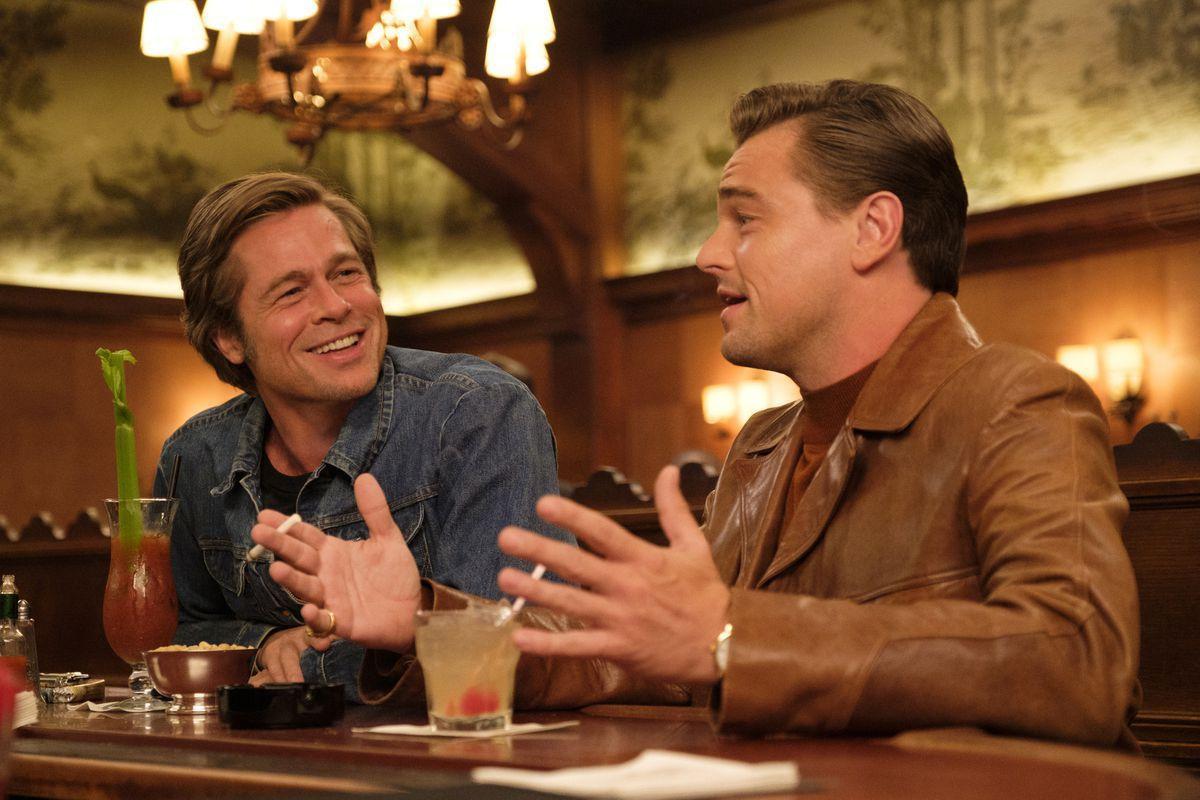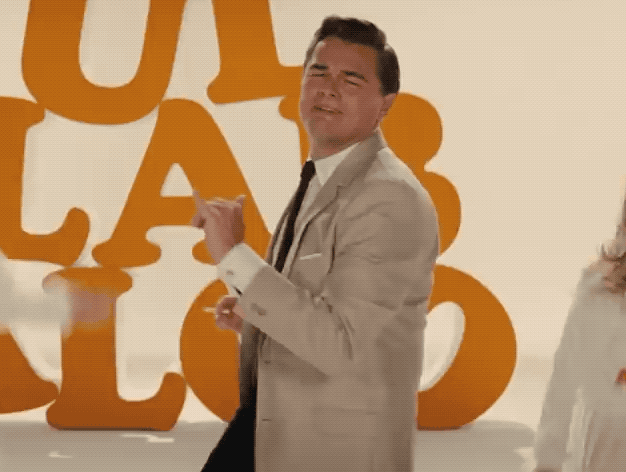Quentin Tarantino returned to theaters this weekend, which means revisionist history, ultraviolence, and odes to movies (and feet) returned to theaters this weekend. Join us as we discuss Once Upon a Time … in Hollywood, Tarantino’s Charles Manson–adjacent film starring a couple of true movie stars, Leonardo DiCaprio and Brad Pitt.
1. What is your tweet-length review of Once Upon a Time … in Hollywood?
Andrew Gruttadaro: Movie stars being movie stars—you really love to see it.
Sean Yoo: I loved hanging with my dads Rick and Cliff. Very fun, good times; 10/10, would recommend.
Miles Surrey: A charming, languid hangout movie from a bygone era, and a heartfelt ode to being washed. Even though Tarantino claims he’ll direct only 10 movies—this was his ninth—Once Upon a Time feels like the perfect Retirement Film.
Michael Baumann: There is a duality of Tarantino: On the one hand, he’s a dazzlingly talented auteur who takes great pains to create exciting, funny, stylish films. On the other hand, he has an appalling lack of empathy as a writer, views “transgressive” and “artful” as synonyms, and hasn’t accepted edits since 1995. When the first Tarantino is in charge, we get some of the best movies of the past 30 years. When the second is in charge, we get The Hateful Eight, which was the single most pointlessly unpleasant moviegoing experience—perhaps the most unpleasant artistic experience in any medium—of my life. Once Upon a Time … in Hollywood is like 65 percent Good Tarantino, 35 percent Bad Tarantino. That’s more than 280 characters, but surely nobody would appreciate going on too long more than Tarantino himself.
2. What was the best moment of the movie?
Baumann: Rick Dalton’s fit of rage in his trailer.
Gruttadaro: The stretch from Rick’s conversation with the child actress (I’m sorry: actor)—in which he’s brought to tears by a dime-store novel about a bronco buster that hits too close to home—to his botched scene to his ensuing trailer freakout to, finally, the moment when he nails his next scene and is told by the child that it was the best acting she’s ever seen (which brings him to tears, again). That was all truly sublime.
Herman: Tarantino’s passion for pop cultural flotsam has never come through as fiercely or as movingly as it does on the set of Lancer. All the most benevolent parts of this movie’s nostalgia are exemplified in Rick Dalton’s guest-acting gig: the affection for faded stars and unfashionable genres, the elevation of ephemera to monumental cinema, the depth of Rick’s angst and the salvation he finds in work well done. It’s a funny, surprising, perfect scene, populated by rediscoveries (RIP, Luke Perry) and new finds (Julia Butters!) alike. Rick deserves as many whiskey sours as he likes.
Knibbs: When Sharon Tate (Margot Robbie) watched the audience watch her during a matinee showing of her latest movie. It was just really sweet and beautiful.
Surrey: I dug all the movies/shows/commercials-within-the-movie—the immaculate attention to detail made Once Upon a Time feel like a living, breathing artifact of the ’60s.
Yoo: Every single thing that happens after Cliff Booth finally smokes that acid-dipped cigarette. Cliff says, “… and away we go!” and away we went with the best final act in any Tarantino movie to date. We got the head-smashing, ferocious-dog-eating, flame-thrower-y ending we all deserved.
3. What was your least favorite part of the film?
Gruttadaro: Can we go back to that whole bit about Cliff murdering his wife?
Knibbs: Margaret Qualley’s filthy feet. She was otherwise lovely but honestly, those yellowed arches were a better argument against joining a cult than all the murder.
Yoo: It’s not necessarily a bad thing, but using Charles Manson for only one scene only threw me for a loop. Also the feet.
Surrey: Personally, I’m just not that into feet—sorry!
Baumann: We’re gonna play Cliff’s killing his wife for laughs? That’s a choice Serious Filmmakers are making in 2019?
Herman: I’m as exhausted by the Tarantino Discourse as the next person, and the parts of this movie that gave me pause don’t erase the ones that thrilled me. But I also can’t turn off the part of my brain that balks when we’re asked to laugh at the possibility that Cliff murdered his nagging wife, or be content with Sharon Tate as a flat, largely mute background player in two men’s story, or cheer when Cliff bashes a young woman’s face into a mantel. At its best, Tarantino’s pining for a bygone era yields a bittersweet reminder of what was lost. At its worst, it creates a world where old-school masculinity has won out over social progress, with the Manson family as its unfair proxies.
4. What are your thoughts on the ending?
Gruttadaro: We’ve done the whole alternate history thing before—and it’s a lot less complicated when deployed to burn Hitler alive—and in a lot of ways, this felt like Tarantino taking the easy way out. Viscerally speaking, though, I can’t really complain about the reappearance of Chekhov’s flamethrower.
Yoo: One of the best parts of the ending that I forgot to mention above was how casual Rick was when discussing the gruesome events with Jay Sebring. He literally burned a bloody hippie to a crisp with a flamethrower and he’s talking about it like it was no big deal. It was the perfect amount of humor after a jaw-dropping climax.
Herman: Tarantino’s clearly no stranger to rewriting history, often in the form of violent retribution for world-historical villains. But the Manson family aren’t Nazis, or slave owners, or even Bill; they were young, manipulated, drugged-out kids, and watching Rick take a flamethrower to one feels a lot less cathartic and a lot more uncomfortable than Aldo Raine’s branding Hans Landa with a swastika. I have no objection to Tarantino “saving” Sharon Tate, and even think it shows a strange kind of softening for his latest alternate history to preserve as many lives as it takes. But even as this ending is more complex than Basterds’ or Kill Bill’s, it’s also less successful.
Baumann: I’m not saying you can’t show violence against women in film, even at the hands of the film’s protagonist, and certainly Cliff’s killing would-be murderers/domestic terrorists isn’t half as disturbing as the fact that him getting away with killing his wife is played for laughs. It’s just disturbing to see it portrayed so … gleefully? Disturbing is probably what Tarantino was going for, but I’m not sure what the point was. It just comes off as a petulant “you can’t make me not offend you”–type gag, like a film school Jim Norton.
Knibbs: It’s complicated. I sort of loved it, and the violence itself wasn’t really an issue for me—it was stylized, slapstick mayhem, too ridiculous to even feel squeamish about—but the obvious glee Tarantino took at the over-the-top carnage was just less compelling than the joy he also clearly took in creating Rick and Cliff’s friendship, and their version of L.A.
Surrey: What did you expect? The dude enjoys his revisionist history, and it isn’t a Tarantino film without a shocking outburst of violence. But Tate’s inviting Dalton over for a drink is also Tarantino at his most sentimental, something that’s a lot more commendable and nuanced than setting a bunch of Nazis on fire (which, it goes without saying, is also fine).

5. Pick one: Brad or Leo?
Yoo: I love both my parents equally. Don’t make me choose.
Gruttadaro: With a shirt on: Leo, because of the stretch I mentioned in Question No. 2. With a shirt off: Brad, by a mile.
Knibbs: I will always pick Leo in general, but this movie belongs to Brad Pitt.
Baumann: Brad. Both in general and here specifically, where he was charming enough to forget from time to time that he murdered his wife and make everyone treat it like a minor professional inconvenience for him.
Surrey: I’ll go with the guy who didn’t kill his wife, and who doesn’t make me feel awful about myself when he takes his shirt off.
Herman: Leo is acting here (and quite well!). Brad is giving pure, unadulterated movie star. In a movie about stardom, Brad wins by default.
6. Who is the best side character in this movie?
Yoo: Mike Moh’s portrayal of Bruce Lee was iconic, and that fight scene with Cliff was basically Tarantino porn. Also … SHWARZZZZZZZS.
Surrey: Brandy is the best movie dog we’ve had in a while. Even the great Charlie Cooper didn’t bite a would-be murderer in the nuts!
Knibbs: The little Method actor girl who makes Rick cry! What a sweetie, what a thespian!
Herman: There’s so little of Sharon Tate’s inner life here that she qualifies as a side character, but Margot Robbie’s performance delivers so much more than what’s on the page. “Be the most charming, carefree person alive” is quite the tall order; Robbie meets it and then some.
Baumann: Well, the most prominent side character is the longing, lustful shot of the female foot. I know Tarantino’s got a foot thing, and go nuts, dude, but I left the theater knowing more about Margot Robbie’s plantar fascia than Sharon Tate—thanks to the only instance in human history of someone wanting to take their shoes off in a movie theater. Then I missed most of the dialogue in the car ride between Pussycat and Cliff because Margaret Qualley’s feet were front and center, pressed up against the windshield like this was a fetish porn parody of Midnight Express. I’m excited to see Tarantino’s Star Trek movie just to see how Starfleet ends up operating with all their crewmembers in flip-flops.
Gruttadaro: Damian Lewis as a lovelorn wallflower-y Steve McQueen for a split second. Actually, never mind: It’s obviously Brandy the dog.
7. Which Rick Dalton movie/show would you pay money to see a full version of?
Gruttadaro: This one:

Herman: I already did! What’s The 14 Fists of McCluskey if not Inglourious Basterds with flamethrowers instead of machetes?
Baumann: I found myself quite interested in the whole Lancer plotline. I’d watch a boozed-up Leo trade barbs with Timothy Olyphant.
Surrey: Give me the box set of every dumb Western he filmed in Italy.
Yoo: I would pay all the money in the world to watch Operazione DYN-O-MITE! Italian James Bond? Yes, please.
8. Which L.A. landmark were you most excited to see in the movie?
Gruttadaro: It was just really amazing to see a Hollywood Boulevard that didn’t resemble hell on earth.
Herman: Hollywood Boulevard has never looked more classy and less clogged with guys in Elmo costumes selling fidget spinners.
Surrey: The long stretches of highway without traffic congestion?
Yoo: I was fortunate enough to watch the movie in the Cinerama Dome, and it was quite the trip when the dome was shown in the movie. The crowd erupted in applause; what a Hollywood moment.
9. Where does Once Upon a Time … rank in Tarantino’s filmography?
Yoo: Too early to say, but I definitely thought it was better than Django Unchained and The Hateful Eight.
Gruttadaro: Just outside of the top five.
Herman: Toward the bottom—which is still to say, better than most other movies.
Surrey: I need more time to sit on it, but I’ll definitely place Once Upon a Time in the upper tier along with Kill Bill: Vol. 1, Pulp Fiction, and Inglourious Basterds. I’m not the biggest Tarantino fan in the world, but most of his movies, including this one, are fun and rewatchable—minus The Hateful Eight, which should be chucked into an active volcano—and this one’s no different.
Baumann: Somewhere in the middle. The cast and visuals were so good, but they just made the Bad Tarantino bits all the more frustrating for having blemished a movie with so much else going for it.
Knibbs: It is certainly in the top three. I always have a hard time making rankings, but I will say that I plan on going to see this movie in theaters again, which I haven’t done for a film in years.
